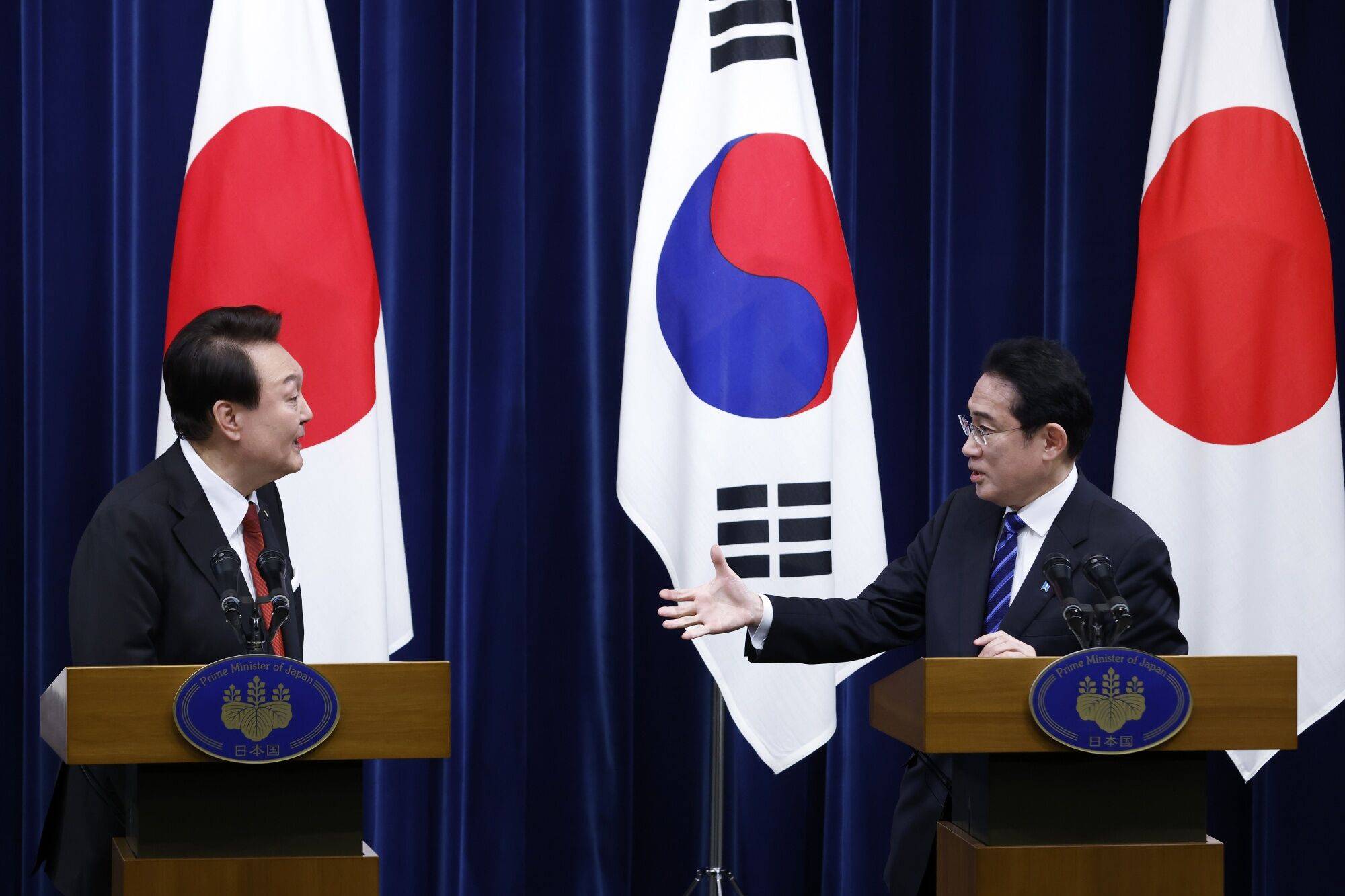Following a North Korean missile launch on the 14th of April, the U.S., Japan, and South Korea have agreed to increase the frequency of missile defense exercises and discussed resuming joint training. While the U.S. has maintained its presence in East Asia as well as its good relationships with both Japan and South Korea, this may be an opportunity for the two East Asian nations to overcome their history and strengthen ties.
The history between Japan and South Korea is rooted in war, colonialism, political usurpation, and cultural self-determination. The tension stemming from the events of the 20th century has remained prevalent into the present. However, the threat North Korea poses to these long-time adversaries may incentivize cooperation. On the 10th of March, Japanese Prime Minister Fumio Kishida welcomed President Yoon Suk Yeol of South Korea to Tokyo for the first bilateral summit between the two geographical neighbors in 12 years. The visit was arranged to increase focus on both national security and economic issues. The most recent response to North Korea’s military advancements may show a shift in both nations’ priorities. Threats to their security may expedite the process of international reconciliation between Japan and South Korea.
While true animosity may have dissipated, interactions between the two East Asian nations have not yet fully reconciled their troubled past. As recently as 2015, the governments of Japan and South Korea were in debates over the validity of Japan’s annexation of Korea in 1910. Due to the volatile and opaque nature of treaties in the pre-WWII era of imperialism, and the potent role of historical memory in domestic politics, the two nations were unable to come to an agreement on whether the annexation of Korea by Japan was or was not valid under international law. South Korea and Japan circumvented the standstill, agreeing that treaties before 1922 had already become obsolete and were thus trivial.
This sweep-under-the-rug approach does little more than serve as a placeholder for true acknowledgment of the problem. Despite the fair arguments held by both sides, Koreans still seem dissatisfied with Japan’s unwillingness to admit wrongdoing, holding themselves as the real victims. This sentiment has remained prominent, surfacing as recently during the 2018 Forced Labor Dispute. Throughout the period of 1910-45, major Japanese companies, known as zaibatsu, took advantage of imperial Japanese rule over Korea in order to conscript Korean workers. In 2018, the Supreme Court of Korea demanded that Japanese companies, including Nippon Steel Corporation and Mitsubishi Heavy Industries, liquidate their assets in Korea and pay reparations. The companies responded, claiming they had already settled any problems related to colonial-era labor disputes, rekindling the fire of issues that have yet to be fully resolved. Japan’s government retaliated the following year, removing South Korea from its list of preferred trade partners.
Despite this recent toxicity and deterioration of relations, South Korean President Yoon Suk Yeol has expressed his determination to repair the relationship between South Korea and its former colonizer. At this year’s commemoration of South Korean independence, President Yoon explained that in order to respond effectively to “security crises like North Korean nuclear threats, trilateral cooperation between South Korea, Japan, and the U.S. is now more important than ever before.” Yoon has also, to the distaste of many of his citizens, decided that reparations for victims of Japanese forced labor would instead be compensated by the government, relieving Japanese companies of their responsibility to pay reparations. The Japanese government has responded by removing export controls on chemicals required for semiconductors and device displays it had placed in 2019.
While this dismissal of Japanese responsibility may be viewed as a cop-out by the South Korean government, the matter shows the urgency of both sides to establish healthy enough relations to ensure national security in the shadow of North Korea’s nuclear threat. Missile tests are not a new occurrence coming out of the isolated East Asian dictatorship; the last one happened less than a month prior, on the 26th of March. However, North Korean ruler Kim Jong Un claims to have successfully manufactured and tested new intercontinental ballistic missiles (ICBMs).
If the statements and photos out of North Korea are to be believed, the most recent test was the country’s first successful launch of a solid-fuel ICBM. It’s important to note that these last two missiles differ from the majority of the country’s earlier weapons, which were launched using conventional liquid fuel. This new ballistic technology has been Kim Jong Un’s focus for years as an integral part of his plan to modernize his country’s military and will greatly enhance North Korea’s ability to launch nuclear attacks on surrounding territories, reducing the time and intricacy presently plaguing North Korean missile launches.
Until now, North Korea had to transport fuel and projectiles separately, only beginning the lengthy process of fueling the missile after arriving at the launch site. This entailed a caravan of fuel trucks as well as over an hour spent transferring the fuel, signs, and time that would provide advantages to enemy anti-missile defense operations. The successful manufacture of solid-fuel missiles by North Korea will cut down their offensive disadvantages. The fuel can be installed into the missile on the production line and transported without any stability risks, meaning no obnoxious launch caravans and quicker than ever launch times.
In response to the recent tests, representatives from the U.S., Japan, and South Korea released a joint statement expressing enhancement of “trilateral security cooperation to deter … nuclear and missile threats”. This statement comes in the wake of the 13th Defense Trilateral talks. An important aspect of this joint cooperation is the resumption of information sharing between Korea and Japan which had been paused since 2019. At the conference, the South Korean President expressed his support for security normalization, stating that “the two countries should be able to share information on North Korea’s nuclear missile launches and trajectories and respond to them.”
While these moves towards normalization of relations will increase the countries’ national security, they seem to reflect more of the same under-the-rug attitude in regard to Japanese-South Korean diplomacy. In the face of the larger issue of North Korean aggression, the two governments may truly see each other as valuable allies, but the strength of this alliance is tentative at best. After South Korea agreed it would pay what Japanese companies still owed to laborers, the conservative wing of Japan’s Liberal Democratic Party chastised Prime Minister Kishida for allowing South Korea to continue “distorting and denouncing historical facts.” President Yoon was also criticized for bailing out Japanese companies. With voices on both sides still stuck at such fundamental impasses, it’s difficult to imagine this as any more than a relationship formed out of necessity. Beyond shared external threats and relations with the United States, it may take real acknowledgment of historical issues in order for the nations to turn the page and begin a new chapter.
Featured Image Source: Bloomberg






Comments are closed.